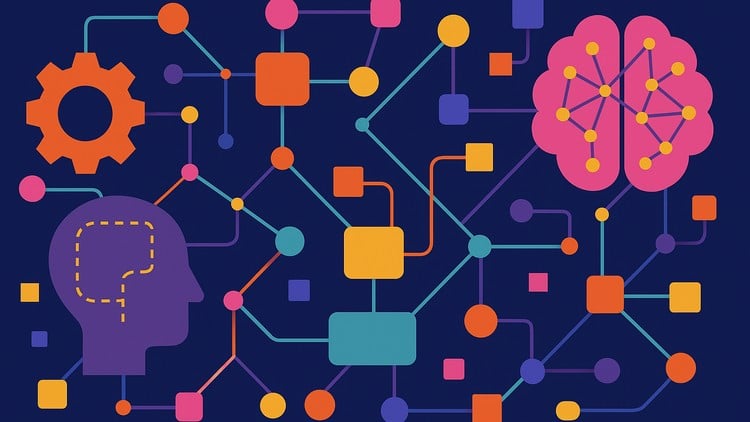
Design and Deploy Scalable GenAI Systems with Ontologies, RAG, and Multi-Agent Architectures
⏱️ Length: 2.0 total hours
⭐ 4.30/5 rating
👥 11,894 students
🔄 August 2025 update
Add-On Information:
Note➛ Make sure your 𝐔𝐝𝐞𝐦𝐲 cart has only this course you're going to enroll it now, Remove all other courses from the 𝐔𝐝𝐞𝐦𝐲 cart before Enrolling!
-
Course Overview
- This certification program elevates your expertise beyond foundational Generative AI by strategically integrating the unparalleled power of Knowledge Graphs into sophisticated architectural designs. Learn to construct intelligent systems that not only generate human-like text but do so with profound contextual awareness, factual accuracy, and explainability. The course emphasizes an architect-level perspective on combining large language models (LLMs) with structured semantic data, enabling you to build highly reliable and performant GenAI applications that address complex enterprise challenges. You will delve into methodological frameworks for bridging the gap between unstructured linguistic understanding and structured domain knowledge, fostering a new generation of AI solutions capable of nuanced reasoning and robust decision-making. This program provides a comprehensive roadmap for transforming raw data into actionable knowledge, then leveraging that knowledge to power highly sophisticated, context-aware generative applications. Prepare to lead the charge in architecting the next frontier of AI, moving from reactive problem-solving to proactive, knowledge-driven innovation.
-
Requirements / Prerequisites
- A solid understanding of core AI/ML concepts, including familiarity with different machine learning paradigms, model training, and evaluation metrics.
- Proficiency in at least one modern programming language, preferably Python, with experience in developing and debugging applications.
- Basic knowledge of cloud computing fundamentals (e.g., AWS, Azure, GCP) and an understanding of containerization concepts.
- Prior experience with database systems, particularly an understanding of data modeling principles (relational, NoSQL, or graph databases).
- An analytical mindset and a strong desire to design, evaluate, and optimize complex software systems, particularly in the realm of Artificial Intelligence.
- Familiarity with the capabilities and limitations of Large Language Models (LLMs) and their application in various problem domains.
- Enthusiasm for cutting-edge AI technologies and a commitment to understanding the underlying architectural principles that drive their successful implementation.
-
Skills Covered / Tools Used
- Strategic System Design: Master principles of designing resilient, scalable, and maintainable Generative AI architectures, considering data governance, security, and lifecycle management.
- Semantic Data Modeling: Develop expertise in conceptualizing and formalizing domain knowledge into structured, machine-readable formats, facilitating enhanced AI reasoning and contextual understanding.
- Advanced Retrieval Paradigms: Learn to architect intelligent information retrieval systems that integrate deep semantic understanding for precision and recall in GenAI applications.
- Agentic Workflow Orchestration: Gain proficiency in orchestrating sophisticated multi-agent systems, enabling autonomous, collaborative, and goal-driven AI behaviors within complex workflows.
- Cloud-Native Deployment Strategies: Understand best practices for deploying and managing high-performance GenAI workloads in production cloud environments, focusing on scalability, cost-efficiency, and operational excellence.
- Architectural Documentation & Communication: Acquire skills in articulating complex technical designs, creating comprehensive documentation, and effectively communicating solution value to stakeholders.
- Performance Optimization & Monitoring: Learn methodologies for evaluating system performance, identifying bottlenecks, and implementing optimization strategies, alongside setting up robust observability frameworks for GenAI deployments.
- Ethical AI & Governance: Explore considerations for developing responsible GenAI systems, including bias mitigation, transparency, and data privacy, integrating ethical guidelines into architectural decisions.
- Conceptual Tools: Leverage architectural frameworks (e.g., TOGAF), design patterns for distributed systems, and MLOps best practices for GenAI deployments.
- General Tool Categories: Utilize version control systems, CI/CD pipelines, integrated development environments (IDEs), cloud provider SDKs, and generalized data visualization tools.
-
Benefits / Outcomes
- Become a Pioneer: Position yourself at the forefront of AI innovation, capable of architecting cutting-edge Generative AI solutions that are robust, factual, and highly intelligent.
- Strategic Impact: Drive significant business value by designing AI systems that solve complex problems, improve decision-making, and open new avenues for product and service development.
- Enhanced Problem-Solving: Develop a refined ability to identify, analyze, and architect solutions for intricate enterprise-level challenges using a hybrid AI approach.
- Career Advancement: Elevate your profile as a certified Generative AI Architect, making you a highly sought-after expert in a rapidly expanding field.
- Master of Context: Gain the unique skill set to imbue AI systems with deep contextual understanding, moving beyond superficial generation to truly meaningful and accurate outputs.
- Leadership in AI Projects: Lead complex GenAI initiatives with confidence, from conceptualization and design to deployment and ongoing optimization.
- Future-Proof Your Skills: Acquire knowledge and abilities that are essential for the evolving landscape of AI, ensuring long-term relevance and adaptability in your career.
-
PROS
- Holistic Architectural View: Provides a comprehensive, end-to-end perspective on designing, building, and deploying advanced GenAI systems, moving beyond isolated components.
- Cutting-Edge Integration: Uniquely combines the power of LLMs, Knowledge Graphs, and multi-agent systems, addressing the critical need for factual grounding and complex reasoning in GenAI.
- Industry-Relevant Skills: Equips learners with highly demanded skills for creating scalable, robust, and production-ready Generative AI applications in enterprise environments.
- Strategic Problem-Solving: Focuses on translating business requirements into technical architectures, enabling participants to deliver tangible ROI and innovative solutions.
- Certification Value: Offers a specialized certification that validates expertise in a niche yet critical area of AI, enhancing professional credibility.
-
CONS
- Given the extensive scope of an “architect” role and the depth of topics covered, continuous self-study and practical application beyond the course content will be essential for true mastery.
Learning Tracks: English,Development,Data Science
Found It Free? Share It Fast!